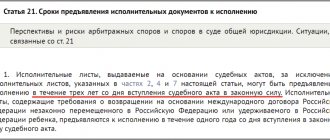Bill 73983-5, introducing a new system for counting time served in a pre-trial detention center when serving an actual sentence, has become a landmark in the humanization of criminal legislation.
It was under consideration in the State Duma of the Russian Federation for a little over ten years, and was considered in the final readings in just a few months. In this case, the activity of human rights activists and the public played a role (for example, a petition was formed on the website Change.org). Currently Art. 72 of the Criminal Code of the Russian Federation, as amended for 2021, with comments and explanations from experts, is available on all legal portals, as it was included in the Criminal Code of the Russian Federation in a new form, using the “day in one and a half” system. However, there are exceptions to this rule. We will consider the application of the above amendments in more detail later in the article.
Legal assistance:
Free in Russia: 8
Dear readers!
The free legal assistance hotline is available for you 24 hours a day!
Why is this law needed?
Conditions of detention should not be more severe than the punishment that the court can impose - this is the position of the European Court of Human Rights.
Back in 2008, this was indicated in the explanatory note to the bill. The conditions in a pre-trial detention center are more stringent than in a general regime colony or a colony-settlement. In a colony, a person spends a lot of time in the fresh air, he can work and study. In a pre-trial detention center, apart from a short walk in a small courtyard, a person is in a confined space.
In accordance with the law, the preliminary investigation must take place within two months, but there are many opportunities to extend it - up to a year or more. When the investigation is completed and the prosecutor's office has approved the charges, the case is sent to court - which can also take months. All this time the arrested person can be kept in a pre-trial detention center.
The explanatory note also speaks of the “current lack of opportunity” to bring conditions in the pre-trial detention center in line with international standards. This problem is still relevant today, so the “preferential” credit for time spent in a pre-trial detention center is also a form of compensation for people for being kept in inappropriate conditions.
History of the bill's adoption
The idea was actively put forward to the masses in 2008-2009 by representatives of the Federal Penitentiary Service. As a result, she managed to obtain approval from the government and the RF Armed Forces. Subsequently, the issue became controversial again: critics were convinced that there would be no final solution to the issue due to ignoring the principle of equality. There were several reasons for this, in their opinion.
- Ignoring equality positions. If we consider an example from judicial practice, we can imagine two people committing a murder and receiving identical punishment. But for some reason, the case of one of them required more time for consideration. It turns out that, due to the new calculation scheme, he will serve a shorter sentence than his accomplice. This is, at the very least, unfair.
- Risk of local corruption. Critics argued that if the bill were passed, there would be an incentive to stay in pre-trial detention for as long as possible in order to reduce the sentence. This, in turn, will provoke corruption.
- Resistance from law enforcement agencies. Their representatives have already spoken out about the implementation of the new legislative norm, and in a negative way.
There is one more practical example worth taking into account. So, the citizen committed a criminal act, and in the process he was taken into custody. It took representatives of law enforcement agencies a year to investigate the details, during which the culprit spent time in a pre-trial detention center. The court decided to imprison the offender for a year in a colony. According to the new rules, his sentence includes “an extra six months.” What to do in this situation remained a question for critics!
What will the new law lead to?
Only practice will tell. The FSIN hopes that it will help relieve the congestion in pre-trial detention centers, many of which are “over-limited” - that is, they hold more prisoners than normal. Human rights activists hope that investigators will keep fewer people behind bars before trial. But there is an opinion among security officials that, on the contrary, many will try to stay in a pre-trial detention center for as long as possible: they will have to spend less time there than in a general regime colony or a colony-settlement. In any case, it is expected that, thanks to the new law, approximately one hundred thousand prisoners will have their sentences reduced. This is the main reason for his support from human rights activists.
What to do if you are in a pre-trial detention center and are given a fine?
If the court has imposed a fine on the guilty party as the main punishment, it may ultimately be mitigated by taking into account the time spent in the pre-trial detention center. However, the fine cannot be replaced by days that have been served, since punishments are not interchangeable. The same approach is extended to the right to occupy specific positions or conduct certain activities.
For example, a person was accused of abuse of power. It took the authorities 2 months to investigate this case. During this entire period, the accused party was in pre-trial detention. After this, the court conducted a full review of the case and imposed punishment in the form of deprivation of the right to occupy specific positions for 3 years. In this case, the perpetrator may be released from punishment, or he may be commuted.
How will time spent in custody be counted?
The law provides for a complex but clear system for recording time. We are talking about recounting the time spent not only in a pre-trial detention center, but also, for example, in a temporary detention center before being placed in a pre-trial detention center.
One day in custody will be equal to:
- 3 days of correctional labor and restrictions on military service;
- 2 days in a colony-settlement, restriction of freedom, forced labor and arrest;
- 1.5 days in a disciplinary military unit, educational colony and general regime colony;
- 1 day in prison, a special or strict regime colony;
- 8 hours of compulsory work.
Those convicted of repeat offenses, serious and especially serious crimes, with a maximum punishment of ten years, are kept in maximum security colonies and prisons. In special regime colonies - those sentenced to life imprisonment. True, for exemplary behavior, prisoners even on particularly serious charges have the opportunity to end up in a colony settlement.
Recent and planned changes
No amendments after Federal Law-186 of 07/03/2018, which became bill 73983-5, in Art. 72 of the Criminal Code of the Russian Federation has not been introduced, and legislators do not yet plan to return to this issue. Thus, there is no reason to think that a “day and a half” system will be introduced for a strict regime in 2021; the latest news on this topic does not indicate the development of relevant bills.
However, the results of the Federal Law No. 186 are already impressive: the Federal Penitentiary Service reported that, as a result of its implementation, over the period elapsed since its adoption, the terms of imprisonment were reduced for 96,000 prisoners.
Will there be a criminal amnesty in 2021 and under what articles?
Who won't get their deadlines recalculated?
- Convicted of repeat crime;
- Those sentenced to death - if the exceptional measure was replaced by life imprisonment or 25 years of imprisonment. Since 1996, Russia has had a moratorium on the death penalty.
Convicted under articles:
- About terrorism, promoting terrorism, calls for terrorism, undergoing training to commit terrorist attacks, participation in a terrorist community or organization, an act of international terrorism;
- About the taking of a hostage by an organized group, or resulting in the death of a person, as well as about the hijacking of an aircraft associated with terrorist activities.
- On the illegal production, sale or transfer of drugs, as well as the acquisition, storage, transportation, manufacture, processing of drugs on a large and especially large scale.
- About drug theft or extortion
- About high treason and espionage, an attack on the life of a statesman and public figure, violent seizure of power, armed rebellion, as well as attacks on persons and institutions enjoying international protection.
What time frames are taken into account during the calculation process?
There are several options by which we mean the time the subject is directly in custody.
- Duration of administrative detention and arrest. This issue is regulated at the level of administrative legislative norms. There is a risk of difficulties with criminal law qualifications. For example, a person was detained for hooliganism (an administrative crime), and then his criminal acts came to light, so he has to change his qualifications.
- The time at which the person suspected of committing a criminal act was detained. Regulation of this issue is ensured by the norms of criminal procedure legislation.
- The period of detention as a preventive measure. The procedure for this process is regulated by the provisions of criminal procedure legislation.
- The moment of application of medical measures in relation to the accused party, for example, treatment in a mental hospital, undergoing a medical examination.
- The duration of arrest in disciplinary terms, this measure is applied to a military personnel and is regulated by relevant norms. This situation occurs when there are difficulties in the qualification process. Let’s say a person violated the rights of serving at the border. At first, this offense was considered disciplinary, and then became a crime against service, i.e., reclassification occurred.
Another case is related to the undertaking not to leave, namely, whether it acts as a period subject to offset. In fact, this measure has nothing to do with the category of “detention”, therefore it is not “enrolled” in the term of imprisonment.
Who will sit longer because of the new law?
The new law worsened the situation of some convicts. Firstly, he equated two days under house arrest to a day in custody and imprisonment. Previously, a day in custody was considered a day locked up at home.
Secondly, “time flows” according to the one-to-one formula for convicts who end up in penal colonies in a punishment cell or a cell-type room. Practice shows that it is virtually impossible to challenge the imposition of disciplinary sanctions on prisoners - who are brought to isolation wards.
There are many examples when prisoners, through the courts, on the initiative of jailers, have their conditions of detention tightened: for example, from a settlement to a general regime or from general to strict. Such measures were applied to anti-fascist Alexei Sutuga, nationalist Igor Stenin and other political prisoners.
And this, too, is virtually impossible to dispute. If previously this led to a deterioration in the conditions of imprisonment, now it will lead to the fact that “undesirable” prisoners will serve even longer than they could.
When was the law published?
Already on July 3, 2021, a law amending Article 72 of the Criminal Code of the Russian Federation was posted on the official Internet portal www.pravo.gov.ru, which was adopted by the State Duma on June 21, 2018, and approved by the Federation Council on June 27, 2018.
According to this law, the following changes are introduced to Article 72:
- the time during which the accused is in custody before the court considers the case and makes a decision will now be counted towards the period of detention in a military unit with a ratio of 1:1.5, that is, one day to one and a half days;
- if we are talking about restriction of freedom, forced labor or arrest, then the ratio will be 1:2, that is, one day in two days;
- if it comes to correctional work, then the ratio is: 1:3.
How to deal with recalculation? Will a day and a half in pre-trial detention be the law in 2021?
Many people are concerned about how days in pre-trial detention centers will be recalculated if the amendments come into force. By a court verdict or by the detention regime at the time the edit was published?
Let's consider an example from judicial practice.
The court's verdict imposed a strict regime for serving the sentence, but now the person is in a penal colony.
The 1:2 recount will still affect him. But only if the amendments are adopted and receive the status of law.
What is the maximum and minimum period?
How long can a person stay in a pre-trial detention center? If the authorities pass the bill on recalculation under Art. 72 of the Criminal Code, then they will have to consider the length of time a person will remain in a pre-trial detention center . Otherwise, there will be “too great a temptation” to prolong the preliminary investigation in order to later “cut off” the term of serving the sentence.
- The minimum period of stay in a pre-trial detention center is not specified. Everything depends on the interests of the investigation (which is why a serious corruption loophole can arise here). If the suspect has nothing to hide, and the investigation has no serious reasons to keep him in a pre-trial detention center, release is possible literally within 1 day.
- The maximum period of stay in a pre-trial detention center is not specified. It all depends on the type of crime, the specifics of the investigation and other nuances.
The features of the maximum period of detention in a pre-trial detention center are as follows:
- the standard period of stay should not be more than 2 months (requirements of paragraph 1 of Article 109 of the Code of Criminal Procedure of the Russian Federation);
- if the investigation does not have time, and 2 months is too short a period, then the preventive measure can be extended to 6 months (and this norm is in paragraph 2 of Article 109 of the Code of Criminal Procedure of the Russian Federation). But here it is important to keep in mind one nuance: there must be a risk that the suspect, after leaving the pre-trial detention center, will be able to hide traces of the crime or commit other socially dangerous acts;
- if the circumstances of the case are complex, or grave or especially grave acts are to be investigated, then the investigator/head of the investigative body writes a petition. You can extend the period of stay in a pre-trial detention center to 1.5 years. Of course, all this time will be subject to recalculation in accordance with the prescribed rules and requirements.
There is formally a ban on longer stays in pre-trial detention centers. But it can also be circumvented by isolating the prisoner for a period of 2 or 3 years. To do this, you only need to provide the prisoner with 10 volumes of case materials for subsequent review.
Who ends up in a pre-trial detention center?
Important! Please keep in mind that:
- Each case is unique and individual.
- A thorough study of the issue does not always guarantee a positive outcome. It depends on many factors.
To get the most detailed advice on your issue, you just need to choose any of the options offered:
- Use the online chat in the lower corner of the screen.
- Call: Federal number: +7 (800) 511-86-74
The internal regulations of the penitentiary system of the Russian Federation require that the following groups of prisoners be kept in pre-trial detention centers:
- Those under arrest and investigation.
- Awaiting trial or its completion.
- Detained foreigners (leave the institution upon extradition at the place of registration) or citizens of the Russian Federation expelled from another country.
- Those awaiting transfer after the announcement of the measure of restraint on freedom.
Also, persons sentenced to economic work aimed at maintaining the pre-trial detention center in proper condition remain in the institution to serve further sentences. In addition to them, the court allows citizens whose term of restriction of freedom is no more than six months to remain in the detention center.
Time of detention
The conditions of detention in the detention centers influenced the course of the investigation. Bad food, overcrowding, short walks - all this forced a person to agree to anything just to leave the place of detention.
In particular, the above affected citizens under investigation for economic crimes or road accidents - people far from the criminal environment. Although the conditions of detention have not changed, the investigators have lost the motive to delay the process.
Initially, the legislation limits the pre-trial period of detention to 2 months. This is stated in Article 109. Code of Criminal Procedure. In practice, the terms are extended due to the discovery of new circumstances when a person spent a year or a year and a half in a pre-trial detention center.
How is the length of stay in a pre-trial detention center calculated? Which days are counted?
The period of serving the sentence includes ALL days when the person was under investigation until the court decision entered into legal force. Please note that the deadline continues after the court hearing (all the time when a person has a chance to appeal the verdict).
The person was convicted under Part 1 of Art. 163 for 1 year and 3 months (general regime colony). He served his sentence for 8 months, and is now being transferred to another prison. Chelok is in a pre-trial detention center. How is time in a pre-trial detention center calculated correctly: 1 day or 1.5 days or 2 days?
Here it is important to keep in mind the different status of people: arrested and convicted . Article 72 of the Criminal Code of the Russian Federation applies only until the sentence enters into legal force. But in this case, the sentence came into force long ago, and the convict served part of the sentence.
A completely different rule applies here - Part 7 of Art. 76 Criminal Executive Code.
It provides for the detention of convicts in so-called transit and transit points (TPP).
Placement in the Chamber of Commerce and Industry is carried out under the same conditions as the conditions for serving a sentence.
This means that in transit the convicted person serves his sentence under the general regime . Here the mathematics follows the principle of “one day at a time.”
The person is under investigation under Part 2 of Article 159. How to count days? Is there a recount? Staying in a pre-trial detention center under investigation is calculated using the formula “1 day = 1 day” . The formula “a day in two is possible only when punished in the form of restriction of freedom or when imposing other punishments not related to imprisonment.
A person is serving a sentence in a pre-trial detention center under Article Part 2 of Art. 111. The punishment imposed by the court is 3 years of general imprisonment. How will the term be counted? In this case, the “day by day” rule applies again .
Before sentencing, the man spent 6 months in a pre-trial detention center. He was sentenced to 1.5 years, but then it turned out that the period of stay in the pre-trial detention center was not counted towards the total term. Why did it happen? What to do?
In Part 3 of Art. 72 of the Criminal Code clearly states that the period of stay in a pre-trial detention center is counted towards the term of imprisonment . If this was not taken into account and calculated in the verdict, you will have to file a complaint.
When a person was brought to criminal liability, he had to be “given” a lawyer. Check the issue of recount with the lawyer who is participating in the court hearing to dispel any questions.
For which categories of convicts a day and a half is not counted?
The innovations do not affect malicious violators of the law serving their sentences in strict, special and prison conditions.
A strict regime is assigned to repeat offenders and men who have committed serious crimes for the first time. A similar format of serving is not provided for women.
The worst and most dangerous criminals are kept in a special regime. We are talking about committing crimes of special gravity:
- forms of terrorism - participation, complicity, presence in an organization;
- crimes related to hostage taking, aircraft hijacking;
- high treason and espionage. This category also includes armed rebellion, assassination attempts on state and public officials, attacks on diplomatic institutions;
- crimes related to large quantities of drugs, theft and extortion.
A day and a half does not count towards the time spent in a punishment cell.










